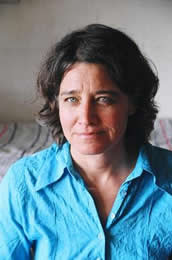 Yulie Cohen Gerstel was born and lives in Tel Aviv. Before starting to work in films, she studied sociology and anthropology at Tel Aviv University (BA) and received an MA with distinction in Communication Art from NYIT. During the 80’s Gerstel was working in films in New York and LA. Since 1988 and 1990 she is raising her 2 daughters. In 1993 she became an independent filmmaker. Her films include 8 x 30 min. documentaries. During 2000/2001 she co-produced RAMLEH and FOR MY CHILDREN with Michal Aviad.
Yulie Cohen Gerstel was born and lives in Tel Aviv. Before starting to work in films, she studied sociology and anthropology at Tel Aviv University (BA) and received an MA with distinction in Communication Art from NYIT. During the 80’s Gerstel was working in films in New York and LA. Since 1988 and 1990 she is raising her 2 daughters. In 1993 she became an independent filmmaker. Her films include 8 x 30 min. documentaries. During 2000/2001 she co-produced RAMLEH and FOR MY CHILDREN with Michal Aviad.
MY TERRORIST, Gerstel’s first long form documentary, (2002, Doc. 58 min.) was directed and produced by Cohen Gerstel. MY TERRORIST received a special jury prize in The Jerusalem Film Festival, was nominated for the Silver Wolf Award at IDFA and has been selected to over 80 film festivals around the world. In 2004, she released the follow-up, MY LAND ZION.
Cinema Without Borders: Let me ask you first that what inspired you to become a filmmaker?
Yulie Cohen Gerstel: During The First Lebanon War (1982) I was a captain in The Israeli Air force – a media attaché. Inspired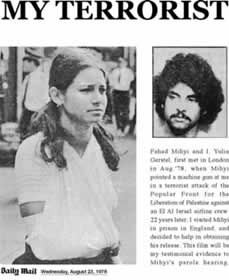 by the power and influence of pictures, I decided to try and make a difference using this power. Although I studied Sociology for my BA, I left the Israeli army and went to New York to pursue an MA in Communications Arts. Two years later, after graduating, I started working on films productions. At the age of twenty eight with a master degree with distinction, I started working as a production assistance/driver in a non-union feature film production for HBO in NYC. On the next film I was promoted to a camera assistance/loader (35 MM) and on the third, I became a scri pt supervisor. Working then, next to some very interesting directors such as Peter Gothar (Hungarian), Andrew Horn and the Independent Producer – Yoram Mandel, I learnt a lot about filmmaking and got inspired to do it on my own/ by myself.
by the power and influence of pictures, I decided to try and make a difference using this power. Although I studied Sociology for my BA, I left the Israeli army and went to New York to pursue an MA in Communications Arts. Two years later, after graduating, I started working on films productions. At the age of twenty eight with a master degree with distinction, I started working as a production assistance/driver in a non-union feature film production for HBO in NYC. On the next film I was promoted to a camera assistance/loader (35 MM) and on the third, I became a scri pt supervisor. Working then, next to some very interesting directors such as Peter Gothar (Hungarian), Andrew Horn and the Independent Producer – Yoram Mandel, I learnt a lot about filmmaking and got inspired to do it on my own/ by myself.
CWB: Your life story is connected to your famous film “My Terrorist”. How did you come up with the idea of this documentary? 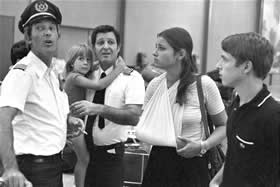 Yulie: On 1999 I made a short documentary film about the Palestinian activist – Imad Sabi – who was deported from Israel and Palestine by the Israeli security services. The human encounter with Imad, his wife and their daughter, made me think about “my terrorist” for the first time in a forgiving way. It was 21 years after Fahad shoot at me in one of the London’s streets. The year 2000 was an optimistic year in our bloody region, and I started to look for Fahad Mihyi/“my terrorist”, believing that he was back here; released from the British prison. After not finding him in Palestine, I was trying in prisons in Britain and as I found he was still behind bars, I decided to make a film about our reconciliation, wanting to tell a story about forgiveness.
Yulie: On 1999 I made a short documentary film about the Palestinian activist – Imad Sabi – who was deported from Israel and Palestine by the Israeli security services. The human encounter with Imad, his wife and their daughter, made me think about “my terrorist” for the first time in a forgiving way. It was 21 years after Fahad shoot at me in one of the London’s streets. The year 2000 was an optimistic year in our bloody region, and I started to look for Fahad Mihyi/“my terrorist”, believing that he was back here; released from the British prison. After not finding him in Palestine, I was trying in prisons in Britain and as I found he was still behind bars, I decided to make a film about our reconciliation, wanting to tell a story about forgiveness.
CWB: In Israel “My Terrorist” was subject to controversy and people either hated the film or loved it, why do you think was that?
Yulie: I was lucky to receive the jury prize in Jerusalem Film Festival when “My Terrorist” first came out in Israel. It was a good start. However, the film raised 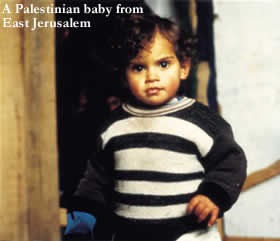 some difficult questions about the Israeli-Arab conflict, the Palestinians’ fate, revenge vs. forgiveness, and mostly about dealing with FEAR. It seems that most of these issues are hard to deal with especially for Israelis Jews who are living in Israel. For others – either living in the west or out of the region – who and are interested to face these topics – the film is a comforting reflection.
some difficult questions about the Israeli-Arab conflict, the Palestinians’ fate, revenge vs. forgiveness, and mostly about dealing with FEAR. It seems that most of these issues are hard to deal with especially for Israelis Jews who are living in Israel. For others – either living in the west or out of the region – who and are interested to face these topics – the film is a comforting reflection.
CWB: How people outside Israel received “My Terrorist”? I mean Palestinians, Jews living outside Israel and others…
Yulie: Outside Israel, the reactions were usually very different; one can easily see the difference in people who are not directly suffering from the conflict. Palestinians who are not living in the region loved the film while their brothers and sisters in Israel – did not.
As for Jews, it varied. Some loved it and were very proud to see a story like this coming out of Israel from a Jewish filmmaker, while others thought it poses a risk to the existence of the State of Israel.
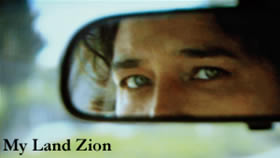 CWB: Do you believe that “My Terrorist” helped people living in middle of the Israeli-Palestinian conflict to have a more pragmatically approach to each other?
CWB: Do you believe that “My Terrorist” helped people living in middle of the Israeli-Palestinian conflict to have a more pragmatically approach to each other?
Yulie: I do believe that “My Terrorist” gave people in the region something, but I am not sure if it helped to bring a pragmatically approach to the people of the region. It may have passed a message that we are all victims of many useless wars and conflicts; that there are no winners. The fact that we all have different point of views about the conflict and this does not help in solving the problem. And, there is a problem; both nations need an independent state.
CWB: Please tell us about “My Land Zion”, what is this film about?
Yulie: My Land Zion – came as the second film in the trilogy called “Mine?”. At the time, I was interested in studying 1948 history witch is closely connected to my country identity. The state of Israel was founded in 1948, and my parents were young soldiers at that year – they were 18 and they were considered the generation who created the state. We were raised up with endless myths around those years and we never knew that 600,000 Palestinians were evacuated from their villages and were never allowed to come back. Those Palestinians have been refugees for almost 60 years – by next year. My Land Zion is about denial of facts.
CWB: “My Land Zion” is another brave movie of yours, how challenging was making of it?
Yulie: The making of My Land Zion was from time to time like walking barefoot in an endless thorns field. I did not know where am I heading but I was sure I 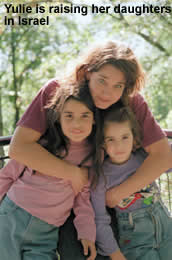 had to go there. I read many different books, watched tens hours of archival footage and shoot more then 80 hours. Before starting the editing of the film, I took a week and then another week of isolation with all the martial, away from home, just to try and understand what did I came up with. It was the toughest time of my life.
had to go there. I read many different books, watched tens hours of archival footage and shoot more then 80 hours. Before starting the editing of the film, I took a week and then another week of isolation with all the martial, away from home, just to try and understand what did I came up with. It was the toughest time of my life.
CWB: In “My Land Zion” you are trying to address the myth made around the 1948 war. How successful is the movie to pass its message in this regard?
Yulie: It is hard for me to know “how successful is the movie to pass its message”, but from the screenings I have attended and the conversations I had with the audience afterwards, I could see that the film opened the eyes of those who did not seen the film before, to the facts. In My Land Zion, I do present the complex picture of the two different narratives; one can not ignore that a few years before 1948, millions of Jews had been murdered in Europe only for being Jew. So it helps, I believe, to loosening the myth made around 1948.
CWB: Please tell us about the projects you are working on now and your future projects.
Yulie: “My Brother” is the third film in the trilogy: “Mine?”. I am at the final phase of editing it. It is a story about a woman who seeks to re-connect with her brother after twenty five years of rift. This woman is me and in the beginning of the Eighties (of the twentieth century), my brother became an ultra orthodox Jew. [It is called making teshuva.] I, and apparently he too, like many good Israeli boys and girls, were in an identity crisis with the country; the first Lebanon war made us doubt the righteousness of the state of Israel and the myth that “it is good to die for your country” – was starting to fade out. The wave of becoming ultra orthodox, which began then, has not stopped to this day. Today (in the year 2007), there are Eight 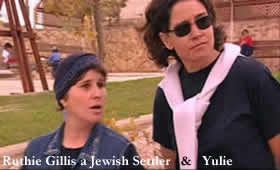 Hundreds and fifty thousands ultra orthodox – who are called Haredis- in the State of Israel.
Hundreds and fifty thousands ultra orthodox – who are called Haredis- in the State of Israel.
As for my other future projects, I guess it will deal with either peace or women’s human rights.
CWB: Who are the filmmakers you admire and please name a few recent movies you have liked most.
Yulie: My favorite film directors are: Tarkovsky, David Lynch and Almodovar. Almodovar’s last film “Volver” is a poem like all of his previous films… I also loved “3-Iron” by the Korean director Kim Ki-Duk. As for my love to documentaries, I recently saw “Calais: The Last Border” by Marc Isaacs and found it excellent.
CWB: Thank you and good luck with your new projects.

